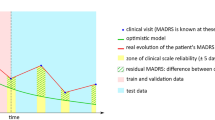Abstract
Predictive modeling techniques using artificial intelligence have shown promising potential in detecting and predicting depression in recent times, adding newer perspectives to mental health assessment and treatment. This paper presents a predictive modeling approach to detect the presence of depression using machine learning techniques. It presents predictive models to detect depression based on depression-related data of a student cohort containing demographic and academic data along with depression information collected through the Beck Depression Inventory questionnaire, in addition to scores such as the PHQ (Patient Health Questionnaire) score, GAD (Generalized Anxiety Disorder) score, and Epworth score, which provide insights into the severity and impact of depressive symptoms, anxiety symptoms, and daytime sleepiness, respectively. The methodology involves data collection and preparation, feature selection, model selection, and model training using machine learning techniques. The results show the performance metrics of different predictive models on various dataset versions generated through preprocessing steps such as normalization, feature encoding, and selection. The best metrics are compared and evaluated, where the Linear Discriminant Analysis model performed best in terms of AUC, F1 score, and other metrics in this specific cohort. Considering the recent advancements of machine learning, incorporating predictive modeling would be important to designing clinical decision support systems, for a comprehensive prediction and analysis of depression in different cohorts, to act as an assistive tool for mental health professionals.
Access this chapter
Tax calculation will be finalised at checkout
Purchases are for personal use only
Similar content being viewed by others
References
Manwell, L.A., et al.: What is mental health? Evidence towards a new definition from a mixed methods multidisciplinary international survey. BMJ Open 5(6), e007079 (2015). https://doi.org/10.1136/bmjopen-2014-007079
ICD-11 for Mortality and Morbidity Statistics. https://icd.who.int/browse11/l-m/en#/http%3a%2f%2fid.who.int%2ficd%2fentity%2f1563440232. Accessed 31 Mar 2023
Lim, G.Y., Tam, W.W., Lu, Y., Ho, C.S., Zhang, M.W., Ho, R.C.: Prevalence of depression in the community from 30 countries between 1994 and 2014. Sci. Rep. 8(1), Article no. 1 (2018). https://doi.org/10.1038/s41598-018-21243-x
Diagnostic and Statistical Manual of Mental Disorders: DSM Library. https://dsm.psychiatryonline.org/doi/book/10.1176/appi.books.9780890425787. Accessed 23 Jun 2022
Bains, N., Abdijadid, S.: Major depressive disorder. In: StatPearls. StatPearls Publishing, Treasure Island (2023). http://www.ncbi.nlm.nih.gov/books/NBK559078/. Accessed 3 Apr 2023
Depressive disorder (depression). https://www.who.int/news-room/fact-sheets/detail/depression. Accessed 19 Apr 2023
Boden, M.A.: Artificial Intelligence. Elsevier (1996)
Tai, A.M.Y., et al.: Machine learning and big data: implications for disease modeling and therapeutic discovery in psychiatry. Artif. Intell. Med. 99, 101704 (2019). https://doi.org/10.1016/j.artmed.2019.101704
5 Trends Emerge in Gartner Hype Cycle For Emerging Technologies. Gartner (2018). https://www.gartner.com/smarterwithgartner/5-trends-emerge-in-gartner-hype-cycle-for-emerging-technologies-2018. Accessed 14 June 2022
Villars, R.L., Eastwood, M., Olofson, C.W.: Big Data: What It Is and Why You Should Care, p. 14 (2011)
Kroenke, K., Strine, T.W., Spitzer, R.L., Williams, J.B.W., Berry, J.T., Mokdad, A.H.: The PHQ-8 as a measure of current depression in the general population. J. Affect. Disord. 114(1), 163–173 (2009). https://doi.org/10.1016/j.jad.2008.06.026
Kroenke, K., Spitzer, R.L.: The PHQ-9: a new depression diagnostic and severity measure. Psychiatr. Ann. 32(9), 509–515 (2002). https://doi.org/10.3928/0048-5713-20020901-06
Beck Depression Inventory (BDI). https://www.apa.org. https://www.apa.org/pi/about/publications/caregivers/practice-settings/assessment/tools/beck-depression. Accessed 04 July 2022
Graham, S., et al.: Artificial intelligence for mental health and mental illnesses: an overview. Curr. Psychiatry Rep. 21(11), 116 (2019). https://doi.org/10.1007/s11920-019-1094-0
Tran, B.X., et al.: The current research landscape on the artificial intelligence application in the management of depressive disorders: a bibliometric analysis. Int. J. Environ. Res. Public. Health 16(12), Article no. 12 (2019). https://doi.org/10.3390/ijerph16122150
Morley, J., et al.: The ethics of AI in health care: a mapping review. Soc. Sci. Med. 1982 260, 113172 (2020). https://doi.org/10.1016/j.socscimed.2020.113172
Higgins, O., Short, B.L., Chalup, S.K., Wilson, R.L.: Artificial intelligence (AI) and machine learning (ML) based decision support systems in mental health: an integrative review. Int. J. Ment. Health Nurs. 32(4), 966–978 (2023). https://doi.org/10.1111/inm.13114
Depression and anxiety data. https://www.kaggle.com/datasets/shahzadahmad0402/depression-and-anxiety-data . Accessed 19 Apr 2023
Patro, S.G.K., Sahu, K.K.: Normalization: a preprocessing stage. arXiv (2015). https://doi.org/10.48550/arXiv.1503.06462
Bruce, P.C., Bruce, A., Gedeck, P.: Practical Statistics for Data Scientists: 50+ Essential Concepts Using R and Python, 2nd edn. O’Reilly Media Inc, Sebastopol (2020)
Vance, W.: Data Science: Tips and Tricks to Learn Data Science Theories Effectively (2020)
García Herrero, J.: Ciencia de datos: técnicas analíticas y aprendizaje estadístico en un enfoque práctico. Alfaomega (2018)
Welcome to Python.org. Python.org. https://www.python.org/. Accessed 28 Oct 2022
Zou, Q., Xie, S., Lin, Z., Wu, M., Ju, Y.: Finding the best classification threshold in imbalanced classification. Big Data Res. 5, 2–8 (2016). https://doi.org/10.1016/j.bdr.2015.12.001
Acknowledgments
This work has been supported and financed by the Cloudgenia group through its technical and operational initiatives.
Author information
Authors and Affiliations
Corresponding author
Editor information
Editors and Affiliations
Rights and permissions
Copyright information
© 2024 The Author(s), under exclusive license to Springer Nature Switzerland AG
About this paper
Cite this paper
Di Felice, M., Deroche, A., Trupkin, I., Chatterjee, P., Pollo-Cattaneo, M.F. (2024). Predictive Modeling for Detection of Depression Using Machine Learning. In: Florez, H., Leon, M. (eds) Applied Informatics. ICAI 2023. Communications in Computer and Information Science, vol 1874. Springer, Cham. https://doi.org/10.1007/978-3-031-46813-1_4
Download citation
DOI: https://doi.org/10.1007/978-3-031-46813-1_4
Published:
Publisher Name: Springer, Cham
Print ISBN: 978-3-031-46812-4
Online ISBN: 978-3-031-46813-1
eBook Packages: Computer ScienceComputer Science (R0)




